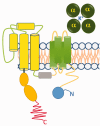Sudden death: Neurogenic causes, prediction and prevention
- PMID: 29053016
- PMCID: PMC5724572
- DOI: 10.1177/2047487317736827
Sudden death: Neurogenic causes, prediction and prevention
Abstract
Sudden death is a major health problem all over the world. The most common causes of sudden death are cardiac but there are also other causes such as neurological conditions (stroke, epileptic attacks and brain trauma), drugs, catecholamine toxicity, etc. A common feature of all these diverse pathologies underlying sudden death is the imbalance of the autonomic nervous system control of the cardiovascular system. This paper reviews different pathologies underlying sudden death with emphasis on the autonomic nervous system contribution, possibilities of early diagnosis and prognosis of sudden death using various clinical markers including autonomic markers (heart rate variability and baroreflex sensitivity), present possibilities of management and promising prevention by electrical neuromodulation.
Keywords: Sudden death; baroreflex sensitivity; heart rate variability; parasympathetic; sympathetic.
Figures




References
-
- Virmani R, Burke AP, Farb A. Sudden cardiac death. Cardiovasc Pathol 2001; 10: 275–282. - PubMed
-
- Stevanović G, Tucaković G, Dotlić R, et al. Correlation of clinical diagnoses with autopsy findings: a retrospective study of 2,145 consecutive autopsies. Hum Pathol 1986; 17: 1225–1230. - PubMed
-
- La Rovere MT, Bigger JT, Jr, Marcus FI, et al. Baroreflex sensitivity and heart rate variability in prediction of total cardiac mortality after myocardial infarction. ATRAMI (Autonomic Tone and Reflexes After Myocardial Infarction) Investigators. Lancet 1998; 351: 478–484. - PubMed
Publication types
MeSH terms
Grants and funding
LinkOut - more resources
Full Text Sources
Other Literature Sources
Medical

